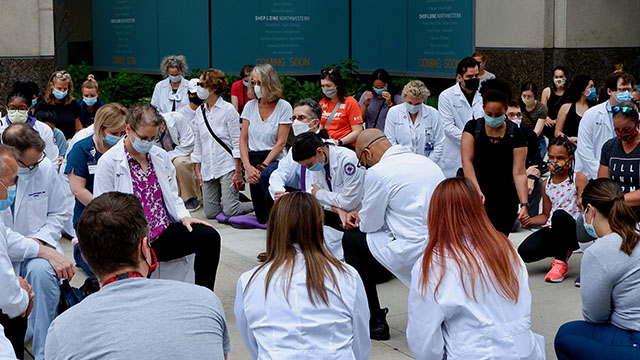In the early morning Friday, June 5, hundreds of members of the Northwestern Medicine community walked from Northwestern Memorial Hospital to Prentice Women’s Hospital. The doctors, nurses, administrators and students wore white coats and surgical scrubs. Some carried signs saying “Black Lives Matter” or inspirational quotes.
At 8:30 a.m., they quietly kneeled for 10 minutes to protest the killing of George Floyd and centuries of racism in America.
“Our community response compellingly demonstrates our strident opposition to racism and a resolve to craft a better and more equitable normal,” said Dr. Clyde Yancy, Northwestern Medicine chief of cardiology and one of the event organizers. “Northwestern Medicine will not allow, tolerate or condone racism.
Let’s hope that today was the first of many steps in a new direction.”
“As health care providers who have been engaged in daily struggles over the past three months to preserve life and restore health in the midst of the crisis of COVID-19, we are repulsed by the loss of life due to social injustice. Our tipping point has been eclipsed. Our silent bows mourned the loss of so many who have felt the sting of racism and united our resolve towards a world, a country, a society that is fair, just and equitable.”
One health care provider wore a quote by Holocaust survivor Elie Wiesel: “Indifference is the sign of sickness, a sickness of the soul more contagious than any other.”
Noted Yancy, “We are not indifferent; we are not inactive; we are no longer quiet.
Let’s hope that today was the first of many steps in a new direction.”
Dr. Quentin Youmans, a fellow in cardiology who graduated from Feinberg School of Medicine and did his residency at Northwestern, said he was filled with emotion at the gathering.
“What was most touching about it was to be with colleagues in all aspects of medicine,” Youmans said. “It left me with a feeling of hope and that everyone is trying empathize with what has happened in the country for black Americans, not just in the last year or decades but in the last centuries. The momentum behind what happened to George Floyd will hopefully lead to substantial change in this country.”
For second-year Feinberg student Tricia Pendergrast, “It was important to show solidarity to my black classmates and colleagues and demonstrate the health care world sees racism and police brutality as threats to public health that need to be addressed in the same way we would address an epidemic.
“I hope everyone there did not walk away thinking ‘my job is done’ but rather thought ‘what can I do better in my department, my curriculum and my classes to diversify the way I practice medicine?’”


